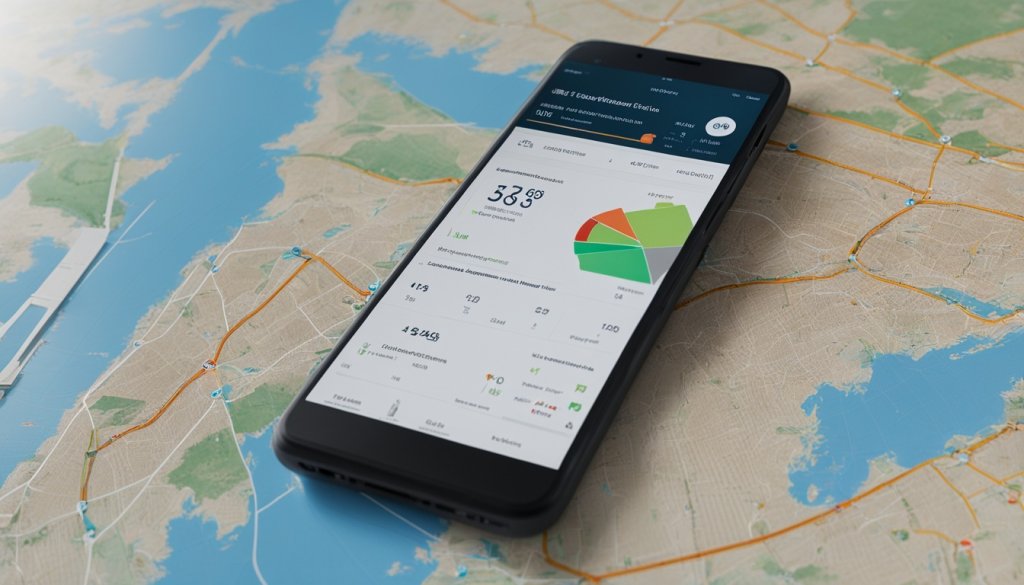Imagine you run a successful field service business with dedicated technicians. Your team is always on the move, helping customers and solving problems. Your success relies on managing appointments well, keeping schedules in order, and ensuring clear communication. But managing all this gets trickier as your business grows. Soon, keeping up with everything leads to missed appointments, late responses, and unhappy customers.
Integrating field staff management software with your CRM can change the game. This move combines the power of both systems. It helps you manage your business better, boosts relationships with customers, and makes your team more efficient.

Key Takeaways:
- Integrating field staff management software with CRM can optimize operations and improve efficiency.
- Streamlining operations through CRM integration results in improved customer relationships.
- Maximizing efficiency with CRM integration enables businesses to meet customer demands effectively.
- By integrating field staff management software with CRM, businesses can unlock higher productivity.
- CRM integration provides seamless operations and enhances the overall customer experience.
The Benefits of Integrating Field Staff Management Software with CRM
Bringing field staff management software and CRM together helps businesses in many ways. It boosts how well things run, automates certain tasks, and improves teamwork. This leads to better operations and helps customers have a great experience.
When you mix field staff management tools with CRM, managing customer info gets easier. All customer data gets put in one place. This includes their contact details, the services they’ve used, and what they like. With everyone seeing the same info, teamwork gets a big boost. This means staff from different areas can quickly update and use customer data together. This leads to more personalized customer service and better overall care for clients.
This mix also automates sales and marketing jobs. For example, it makes tracking leads, setting appointments, and following up a lot smoother. Thanks to this, less manual work is needed. This keeps communication with customers on time and regular. It also frees up staff to work on more important tasks.
Mixing these systems also gives you better data and reports. Businesses can create detailed reports that show how customers behave, how sales are going, and how well services are being delivered. With these insights, businesses can make smart changes. They can find areas to better their service and come up with plans to improve how they work.
Connecting your field staff and CRM software makes teamwork better. Everyone has the same customer info. This allows for better coordination. It makes sure info moves smoothly between teams and helps services be given to customers faster. This way of working encourages everyone to work together towards making customers happy. It helps support from different parts of the company too.
For a concrete example, think of a construction company that links its staff and CRM software. Now, the company can see all customer project details and timelines in one spot. This makes it easy for the sales team to work closely with those in the field and clearly update clients. Marketing can now handle email campaigns easier and check how customers respond. The service team is better at planning work for field staff. This smooth link between staff and CRM make teamwork great. It streamlines how work is done, making customers happier in the end.
Key Features of Field Service Management CRM
Field Service Management CRM offers many features. These help service businesses manage operations better. It blends field service with customer management for smoother work and higher efficiency.
Automated scheduling is a central feature. It lets companies assign tasks to technicians smartly. By doing this automatically, companies save time and avoid mistakes. The result is sending the best technician to a job just when needed.
Creating detailed customer profiles is another major aspect. This tool keeps all important customer info in one place. It includes contact details, service records, and more. With such a complete customer view, companies can offer services that really fit their customers’ needs.
Dashboards and reporting tools give real-time business insights. They show key performance numbers right away. This data helps companies make better decisions by offering organizations a clear view of what’s happening.
Keeping track of inventory is vital, too. It makes sure technicians always have what they need for their jobs. This way, businesses cut down on delays, use resources better, and spend less.
Mobile use is a big plus. It lets technicians keep up with job info and stay in touch with customers from anywhere. This tech step up in communication means quicker service and happier customers.
Integration with other software apps is also a key point. It links the CRM to other tools companies use, like accounting or project management. This connection helps work flow better, stops data isolation, and boosts team cooperation.
By using all these features, companies can run their field services much better. They make customers happier and help the business succeed overall.
The Benefits of Using Field Service Management CRM
Field Service Management CRM offers several pluses for companies that offer services. These perks help companies engage with customers better, cut down costs, work more efficiently, and grow their business through insight.
Improved Customer Engagement
It boosts how well a business connects with its customers by showing project updates in real time. This lets companies share news with customers quickly and clearly. By doing this, relationships with customers become stronger. This leads to happier customers who are more loyal.
Reduced Overhead Costs
A big part of this CRM is the automated scheduling and dispatching. It cuts down on the time and resources needed for manual planning. By making tasks and routes more efficient, it cuts on travel and fuel costs. This also cuts on the administrative work, freeing up time for more important tasks.
Increased Efficiency
This system helps streamline how a company runs. It collects all customer data in one place, making it easier to give personalized service. Automation from the CRM makes work easier, reducing manual tasks.
This all results in faster responses and better service. Customers end up more satisfied, too.

Valuable Insights
One of the biggest pluses of this CRM is the detailed reports it can generate. These reports offer deep views into what customers do, how services perform, and trends in how the business is running.
By digging into this data, a company can make smarter choices and find areas to get better. With this knowledge, a company can lead its market and grab new chances to grow.
So, using Field Service Management CRM is a big win for service providers. It helps them talk to customers better, save money, work smarter, and find new paths to grow. It’s a powerful tool for unlocking success in the service industry.
Challenges of Field Service Management CRM Integration
Integrating a Field Service Management CRM brings lots of benefits. But, it comes with its own set of challenges. These include keeping data secure, training users, and tackling integration issues. Overcoming these challenges is key to a smooth integration.
Data security is very important in this process. Companies must make sure their customer data is safe. They should use strong security features like encryption and secure logins to protect data.
Getting employees up to speed presents another hurdle. They need to learn how to use the new system well. Training should cover everything employees need to know to work with the CRM effectively.
Besides, integration issues can pop up. These might be technical problems or data sync troubles. Dealing with these requires careful planning, testing, and the help of IT pros.
Addressing these integration challenges early on is critical. It helps reduce the chances of problems later. By solving these issues, companies can fully benefit from their Field Service Management CRM. This leads to better operational outcomes.
Different Types of Field Service Management CRM
Field Service Management CRM has various solutions for different organizations’ needs. You can choose between cloud-based, on-premise, or mobile systems. This choice depends on your business’s size and goals.
Cloud-based solutions allow easy access from anywhere. You just need an internet connection. This is great for businesses with teams that work in different places. You can manage your staff and customer data anytime, anywhere.
On-premise systems work from your own location. They give you total control over your data and how secure it is. If your business has specific data safety needs, or already has IT set up, this could be the best choice.
Mobile apps are perfect for technicians in the field. They can use these apps on their phones or tablets. This lets them check on job details, look at customer history, and stay in touch with the office. For teams that work outside the office, mobile apps offer the most flexibility.
Finding the best Field Service Management CRM means thinking about your business’s size, what you need, and how you work. Think about how safe you need your data to be, if you need to access things from afar, and how your team moves around.
Licensing Options for Field Service Management CRM
When selecting a Field Service Management CRM solution, companies have two main licenses to choose from: subscription-based and perpetual. It is key to pick the right one based on the company’s needs and financial situation.
1. Subscription-based Licensing:
With subscription-based licensing, you pay a fee every month or year to use the software. This kind of license means you have the freedom to change how much software you need. It is perfect for businesses looking for payment flexibility.
2. Perpetual Licensing:
In contrast, perpetual licensing involves a one-time payment for the software’s unlimited use. This is best for those using the software regularly over a long period. It gives a feeling of owning the software, with no extra fees.
When deciding, consider your budget, future plans, and the level of flexibility you need. Subscription-based licenses are great for payment flexibility. Perpetual licenses give you full control and ownership. Careful consideration of these factors is crucial for choosing the best option for your business.
Compliance Requirements for Field Service Management CRM
Implementing a Field Service Management CRM requires looking into compliance needs. These needs can change based on where the CRM is used. Businesses should check with local authorities to make sure they follow all rules.
Keeping data safe is very important when using a Field Service Management CRM. It’s vital to protect sensitive information. To do this, businesses can encrypt data, control who can see it, and use secure login methods.
When businesses follow compliance rules and prioritize data safety, they can use CRM software confidently. This helps avoid legal and security problems.
Best Practices for Using Field Service Management CRM
To make the most of a Field Service Management CRM, you should follow the best practices. These include setting up procedures, using automation, training your team, and checking how well the system performs.
Establishing Processes and Procedures
Setting clear processes and procedures for the CRM is essential. This means knowing who does what, how to operate, and handling data and clients. It helps make sure everyone works the same way and is responsible for their tasks.
Automating Workflows
Automating tasks is key with a Field Service Management CRM. It lets businesses move quicker by cutting down on manual work. Jobs like assigning tasks, setting schedules, and sending updates can be done automatically. This gives your team more time for important work.
Training Staff
Training your employees well on the CRM system is crucial. They need to know from the basics to the advanced features. Good training means they can use the system effectively and get the most out of it.

Monitoring Performance
It’s important to keep an eye on how well the CRM is doing. This is to spot areas where you can get better and keep success going. By looking at things like how fast you respond or how happy your customers are, you can make smart choices to improve.
Following these practices helps businesses use their CRM to its full potential. It means setting up solid operations, making things run smoother, training staff well, and keeping an eye on performance. This way, companies can make the most out of their CRM, improving how they work and making customers happier.
Resources for Implementing Field Service Management CRM
When businesses start using Field Service Management CRM, they gain from various resources. These aid in smoothly integrating and moving to an automated system. They mainly include:
Online Tutorials
Online tutorials give a step-by-step on setting up and using Field Service Management CRM. They include setting up the system, configuring, and customizing it. Using these, companies make sure their CRM works well and uses its full potential.
Training Resources
Training is key to let users know how to use Field Service Management CRM. It involves user guides, manuals, and videos. These make sure employees know how to make the most of the system. Investing in training boosts how well the system is used and the company’s productivity.
Implementation Support
Getting help while setting up is crucial. Help can come from the CRM vendor or experts in Field Service Management CRM. They offer tips and help fix any issues to make sure the process goes well. This ensures the system is well used.
Using online tutorials, training, and support during setup helps companies. It makes integrating Field Service Management CRM smoother and more effective.
XCALLY: Maximizing the Benefits of CRM Integration
XCALLY is a powerful contact management tool. It works together with top CRMs to bring the full benefits of CRM integration. When XCALLY and CRM are integrated, companies can better take care of their customers. They do this by keeping all customer information in one place, using smart systems to handle customer messages, and seeing important CRM details as they talk or chat. This makes service better, work faster, and the whole business smoother.
Conclusion
Integrating field staff management software with CRM changes the game for businesses. It helps them work better, be more efficient, and make customers happier. This integration lets companies make their work smoother, help their teams work together well, understand customers more, do tasks without manual effort, and use insights for smart choices.
Choosing the right CRM partner is vital. For example, XCALLY can greatly improve your business. It has tools to keep all customer data in one place, route calls smartly, and update customer info as you talk. These features help businesses offer outstanding service, work better, and make everything run smoothly.
Pairing field staff management software with CRM can transform a company’s performance. It turns operations into a well-oiled machine, cuts down on manual work, and tailor-makes customer care. Thanks to options like XCALLY, businesses can ensure their operations work at their best, become more efficient, and lead to happier customers.
See how FieldAx can transform your Field Operations.
Try it today! Book Demo
You are one click away from your customized FieldAx Demo!
FAQ
What are the benefits of integrating field staff management software with CRM?
Combining these tools boosts customer info management and teamwork. It also makes sales and marketing easier. Plus, it gives better insights through reports.
What are the key features of Field Service Management CRM?
This CRM has automation for scheduling and dispatch. It keeps detailed customer records, offers tools for tracking, and manages inventory. It also works on mobile and integrates with other apps.
What are the benefits of using Field Service Management CRM?
It increases how well you engage with customers. It cuts costs and makes things run smoother. By understanding customer habits better, it can boost their satisfaction and your sales.
What challenges should be considered when integrating Field Service Management CRM?
Data security, training for users, and making sure everything works together are key issues to think about.
Is Field Service Management CRM available in different forms?
It comes in several types, such as cloud, on-premise, and mobile apps.
What are the available licensing options for Field Service Management CRM?
You can choose between subscriptions or one-time payments. Your choice depends on your budget and needs.
Are there any compliance requirements for using Field Service Management CRM?
Definitely. You should check with local authorities to meet specific rules. Keeping data safe is a top priority.
What are some best practices for using Field Service Management CRM?
To use it well, set up clear processes and automate what you can. Make sure your team knows how to use it and keep an eye on how it’s performing.
What resources are available for implementing Field Service Management CRM?
There are online guides, training, and special help to get you started. These tools aim to make your CRM launch a success.
How can XCALLY maximize the benefits of CRM integration?
XCALLY works with top CRMs to make managing customers easier and more effective. It helps to keep all customer info in one spot. It also uses your CRM in talking with customers and makes your business more efficient.
What are the overall benefits of integrating field staff management software with CRM?
By bringing these tools together, companies can work better and give customers a great experience. They can also use data smartly to make choices that boost their business success.
Author Bio
Co-Founder & CMO at Merfantz Technologies Pvt Ltd | Marketing Manager for FieldAx Field Service Software | Salesforce All-Star Ranger and Community Contributor | Salesforce Content Creation for Knowledge Sharing






